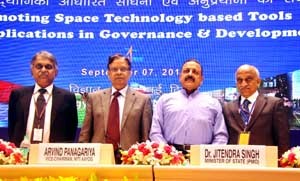Excelsior Correspondent

NEW DELHI, Sept 7: Putting forward a new innovative idea, Union Minister of State (Independent Charge) for Development of North Eastern Region (DoNER), MoS PMO, Personnel, Public Grievances, Pensions, Atomic Energy and Space, Dr Jitendra Singh today proposed setting up a “Hall of Space” in the union capital of New Delhi on the lines of a similar initiative with regard to setting up of a “Hall of Nuclear Energy” which is scheduled to be inaugurated shortly at Pragati Maidan in the union capital. He said, such a center depicting landmark milestones of India’s space journey will offer greater visibility to the achievements of the our space scientists which sometimes go unnoticed possibly also because the Department of Space, like the Department of Atomic/Nuclear Energy, does not have its headquarters in New Delhi.
Dr Jitendra Singh, who was addressing the inaugural session of the day long National Meet on Space Technology at Vigyan Bhawan here today, said that it is a tribute to the vision, determination and courage of founding fathers of India’s space programme like Vikram Sarabhai and Satish Dhawan who saw the dream of exploring space at a time when India had just achieved independence and there were hardly any resources in the midst of other pressing problems including poverty and food scarcity. It is, therefore, a vindication for the present generation including him to be living in times where “we can realise the dream of Sarabhai and redeem the pledge that Sarabhai and his colleagues made to the nation six decades ago”,he said.
Recalling from his personal experience, Dr Jitendra Singh said, as school children, whenever the name of Sriharikota appeared in newspapers during any launching, it sounded like an inaccessible remote space which was out of bounds for most of the common people and therefore, he said, after being given the charge of Department of Space, he looked forward to it as a God-send opportunity to educate himself in a stream of science which was not much known to him.
Under the leadership of Prime Minister Narendra Modi, Dr Jitendra Singh described the past 15 months as a period of glory for India’s space programme because the Prime Minister himself has been taking keen interest and always promoting, supporting and encouraging the space technology initiatives. With IRNSS series in place and the success of Mars-Orbiter-Mission (MOM), India today is on the top in the world as far as space technology is concerned, he observed and added that we are now also generating income through launching of foreign satellites.
Dr Jitendra Singh hailed the diversification of space science in other fields including disaster management which found its utility even in Kashmir floods last year, accurate weather forecast and now also in the field of urban development, housing and building of smart cities.
Arvind Panagariya, Vice Chairman, NITI Aayog, in his address complimented the Space Department for the various flagship programmes launched in different States and Ministries. He described Indian Space Research Organization (ISRO) as among the six largest space establishments of the world and at the same time also most cost effective.
Kiran Kumar, Chairman, ISRO and Secretary, Department of Space presented a detailed resume of the various present and future programmes undertaken by the Department. He also mentioned the diversification of space technology through its involvement in divergent areas including surface water resources availability, solar energy modelling and long term climate change studies.

